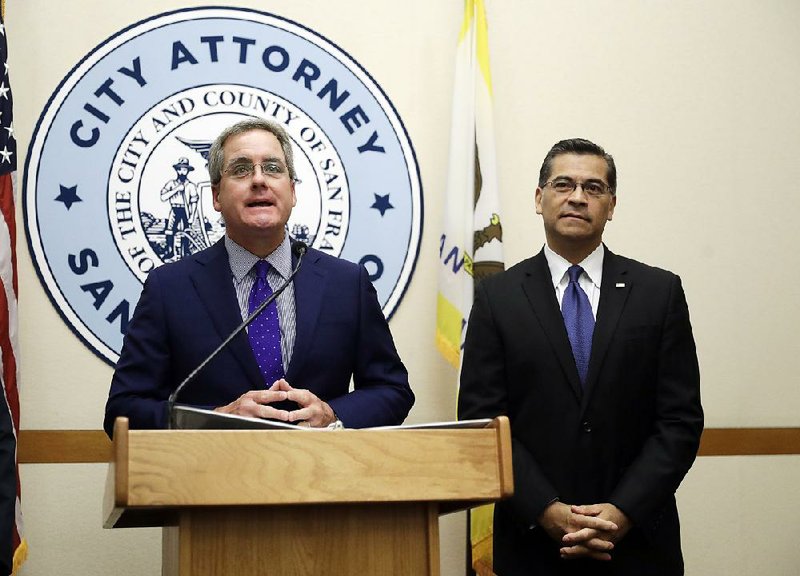CHICAGO -- From defiant lawsuits to reversing policies, U.S. cities and counties are zeroing in on their immigration rules to avoid losing millions in public safety dollars that the White House has threatened to withhold amid a clash over sanctuary policies.
President Donald Trump has made it a top priority to revoke federal dollars from so-called sanctuary cities, broadly defined as places that limit cooperation with federal immigration authorities. Trump says he believes such cities and counties are providing a haven for criminal activity.
Amid an executive order and almost weekly threats by the administration, cities and counties are fighting back.
At least seven cities and counties are suing, and California on Monday became the first state to join the legal fray. Leaders in Baltimore and the Las Vegas area have been trying to prove to the federal government that they don't have sanctuary policies so they can qualify for public safety help. Some local governments have sought to comply with the administration's edicts.
[U.S. immigration: Data visualization of selected immigration statistics, U.S. border map]
The result for cities and counties: growing confusion, budgeting headaches, worries about increased crime and more tension with immigrant residents. And experts expect more lawsuits and turmoil at the local level.
"They're not getting clarity," said Yucel Ors, a program director for public safety at the National League of Cities. "When you're planning budgets or there's an expectation for grants and applications, it becomes very difficult to properly judge what your resource is going to be, especially with law enforcement."
Several lawsuits have cited constitutional concerns in Trump's executive order, including three in California filed by Santa Clara County, San Francisco and the city of Richmond. Two of those lawsuits prompted a temporary injunction.
San Francisco on Monday filed a lawsuit against the Trump administration that alleges federal threats to withhold funding aren't allowed by law and violate the rights of city residents.
City Attorney Dennis Herrera is seeking a federal injunction to prevent the government from imposing new grant-funding conditions on cities. Such conditions would require them to help federal immigration officials in the detention and transfer of people in the country illegally.
"aThese conditions do not appear in any federal statute, and they do not reflect the will of Congress in appropriating funds," the lawsuit says. "To the contrary, the new conditions are simply the latest attempt by the Trump Administration to coerce state and local jurisdictions into carrying out the federal government's immigration enforcement priorities."
The suit was filed against U.S. Attorney General Jeff Sessions and the Justice Department.
Other lawsuits were filed by Seattle and two Boston-area cities. On Monday, California sued over Trump's sanctuary city restrictions on public safety grants, building on similar federal complaints filed last week, including in Chicago.
Chicago targeted new conditions for a grant calling for close cooperation with federal authorities, including access to jails. Chicago, a sanctuary city since the 1980s, calls the changes unconstitutional.
Nationally, the federal government awarded about $264 million to more than 1,000 different entities last year through the Edward Byrne Memorial Justice Assistance Grant program.
The fight has led to chaos in cities and counties that say they're being inaccurately branded by the administration.
Roughly $1 million in Byrne money was in limbo for Nevada's Clark County until this month. The county submitted a 108-page memo covering the role of Las Vegas police to prove it should continue to receive funds it uses for things like juvenile services.
Baltimore officials were baffled when they received an August letter saying they wouldn't qualify for a different federal anti-crime program. The city hasn't formally declared itself a sanctuary city, and city jails are run by the state of Maryland, not the city. Baltimore faces a Friday deadline to prove its case.
In New Mexico, Albuquerque received a similar warning. Albuquerque eliminated a sanctuary policy years ago, but city and county officials approved largely symbolic "immigrant friendly" measures this year. The federal warning appeared to target jail policies in Bernalillo County, where Albuquerque is located.
Two California cities, Stockton and San Bernardino, were also called out after expressing interest in the Justice Department's Public Safety Partnership, which enlists federal agents and technology to find crime solutions. They were told they wouldn't qualify unless they give federal immigration authorities access to jails and notify agents before releasing inmates wanted on immigration violations.
Miami-Dade County reversed its policy earlier this year, saying the county would honor "detainers," or holding people for extra time to be arrested by immigration authorities. Officials defended the change, saying they wanted to keep receiving federal money for body cameras and community policing. However, the reversal is now the subject of an American Civil Liberties Union lawsuit.
Information for this article was contributed by Sophia Tareen and Adriana Gomez Licon of The Associated Press; and by Patrick McGreevy of the Los Angeles Times.
A Section on 08/15/2017
